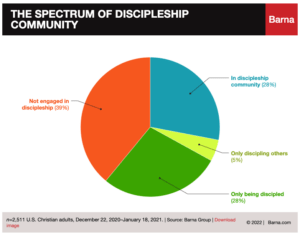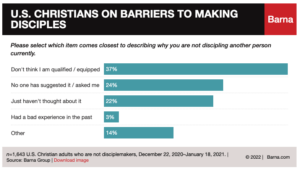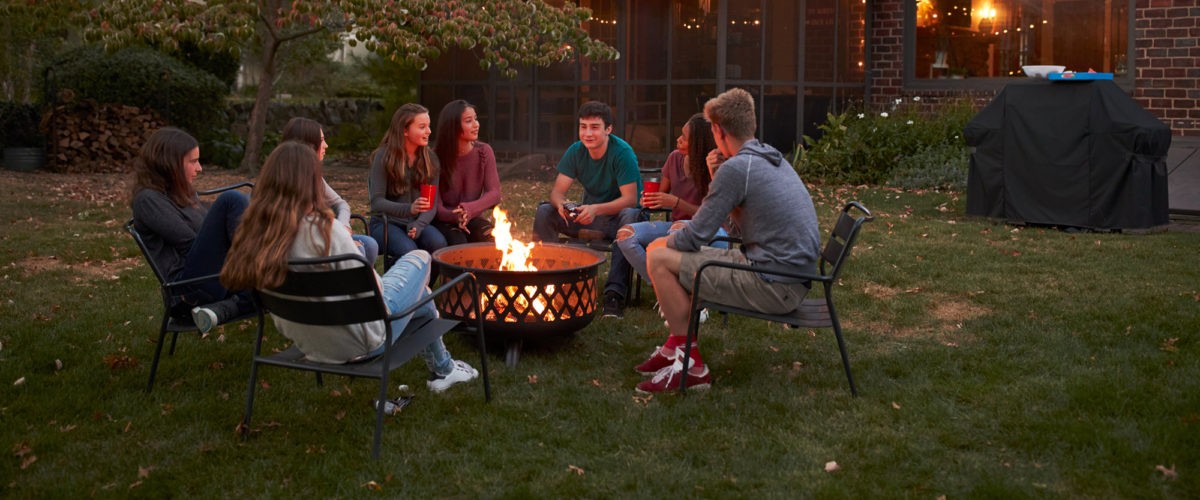Feelings of inadequacy or a case of the jitters seem to be keeping many Christians from sharing their faith with others, according to a new report by Barna Research.
“Not feeling qualified or equipped (37%) is the main barrier” to faith-sharing, along with disinterest in disciple-making or a fear of not being good at it, of not having enough knowledge or of being the wrong person for the job.
“The confidence crisis is a core issue,” the research group said in an article about a project it conducted in partnership with the Navigators, a parachurch ministry.
 The new research also found that, overall, 39% of Christians are not engaged in discipleship at all, while 28% are fully engaged in “discipleship community,” which the report defined as those discipling others and continuing to grow their faith by being discipled. Another 28% are in the “only being discipled” category, and 5% said they are exclusively involved in reaching out to others.
The new research also found that, overall, 39% of Christians are not engaged in discipleship at all, while 28% are fully engaged in “discipleship community,” which the report defined as those discipling others and continuing to grow their faith by being discipled. Another 28% are in the “only being discipled” category, and 5% said they are exclusively involved in reaching out to others.
Researchers reported a direct correlation between involvement in a discipleship community and feelings of faith vitality. Those involved in a discipleship community “also see a stronger connection between their spiritual life and their day-to-day life. About three in five strongly agree their relationship with Jesus impacts the way they live their life every day.”
The findings come amid a flurry of sociological research into the declining patterns of religious behavior and belief in the U.S.
Pew Research Center released a December 2021 survey that found 63% of the U.S. population identifies as Christian — a drop from 75% a decade earlier.
“The secularizing shifts evident in American society so far in the 21st century show no signs of slowing,” Pew reported. “Christians continue to make up a majority of the U.S. populace, but their share of the adult population is 12 points lower in 2021 than it was in 2011. In addition, the share of U.S. adults who say they pray on a daily basis has been trending downward, as has the share who say religion is ‘very important in their lives.”
“The secularizing shifts evident in American society so far in the 21st century show no signs of slowing.”
But the trend is steadily arcing upward for those who said they have no religious affiliation. Pew said that segment now makes up 29% of the population.
“Christians now outnumber religious ‘nones’ by a ratio of a little more than two to one. In 2007, when the center began asking its current question about religious identity, Christians outnumbered ‘nones’ by almost five to one (78% vs. 16%).”
The impact of increasing secularization includes a 50% decrease in congregational attendance from 2010 to 2020, according to the Faith Community Today survey of more than 15,000 U.S. religious groups.
“This means that at least 175,000 faith communities (half of 350,000) in the country have 65 or fewer people in attendance on any given weekend,” according to a recent overview of the report.
Viewed from another angle, the survey continued, “half of all congregations have no more than 38% of their seating capacity occupied during weekend services.”
 Perhaps not surprisingly, Barna said, 56% of Christians “in our increasingly individualized culture” consider their spiritual lives to be “entirely private” while young people prefer evangelism styles that emphasize demonstrating faith over those involving proselytizing.
Perhaps not surprisingly, Barna said, 56% of Christians “in our increasingly individualized culture” consider their spiritual lives to be “entirely private” while young people prefer evangelism styles that emphasize demonstrating faith over those involving proselytizing.
Religiously active teens “also show signs of a deeper faith experience here, favoring attributes like having a personal, vibrant faith (46%), helping others have spiritual experiences (53%) and being aware of one’s own inconsistencies (30%),” Barna said.
In its discipleship report, Barna added that key reasons given for avoiding disciple making include not being asked (24%) and simply not having thought about it (22%).
“Interestingly, a lack of external motivation becomes the chief obstacle for Christians who are being discipled themselves but aren’t helping someone else grow in the same way,” Barna said.
When asked why they aren’t in two-way discipleship relationships with other Christians, 38% said the option hadn’t occurred to them, while 35% said they haven’t found the right person and 15% cited fear of vulnerability.
Barna concluded that church leaders should consider providing the nudge some believers may need to engage in such relationships. “Whether because of this personal wariness around discipleship or more general indifference, some Christians who aren’t making disciples seem only to need a push.”
Related articles:
Why it matters that we must make disciples, not converts | Opinion by Corey Fields
Adult faith formation thriving although different due to COVID
Why conservative content dominates online searches for Bible study helps | Analysis by Mark Wingfield


